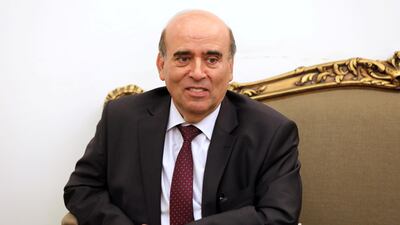The Lebanese Foreign Ministry is preparing a road map for the country to engage in negotiations with Syria over the demarcation of maritime borders, caretaker foreign minister Charbel Wehbe told The National.
The official recommendation will be made once the ministry finalises its review of an agreement under which Damascus recently awarded a Russian company the right to offshore oil and gas exploration in areas that overlap with Lebanon’s exclusive economic zone.
Last month, Syria awarded Kapital, a Russian company, a contract to explore oil and gas in two Syrian-demarcated blocks that overlap with Lebanon’s northern maritime blocks by an estimated area of 750 square kilometres.
Mr Wehbe said the foreign ministry is assessing an unofficial copy of the agreement and will be awaiting the Lebanese army's report on the issue before filing its recommendations to the president and caretaker prime minister.
“Once our assessment is complete, we will submit our report and recommendations for preparing for negotiations as soon as possible,” Mr Wehbe said.
These recommendations, Mr Wehbe said, will probably include the formation of a Lebanese delegation to negotiate the demarcation of Lebanon's maritime borders with Syria, which has not recognised the Lebanese demarcation of 2011.
The ratification of the agreement sparked concerns of another maritime border crisis after Lebanon’s indirect negotiations with Israel under US and UN supervision stumbled in late 2020.
The negotiations came to a standstill after Lebanon demanded an additional area of 1,430 square kilometres that overlaps with part of the Karish natural gas field off Israel’s coast.
Laury Haytayan, an oil and gas expert in the Mena region, said Lebanon should take action on both fronts to protect its rights.
On the one hand, Lebanon should convey its official position over the overlap in maritime blocks to Syria and the UN as well as the Russian company, pending the launch of negotiations with Damascus, which Moscow could play a role in facilitating, Ms Haytayan said.
“Failing to take action could signal that Lebanon deems the situation acceptable,” she said.
On the other hand, caretaker prime minister Hassan Diab and his Cabinet should take swift action to amend Lebanese demarcated borders to protect the country’s rights in its southern blocks before the expected launch of Israel’s exploration programme by early 2022, Ms Haytayan said.
The delay in reaching an agreement over the amendment of Lebanon's southern maritime borders was blamed on disagreements over technicalities between members of Mr Diab's caretaker Cabinet as well as simmering tensions between the country's top officials.
Lebanon's political leaders have yet to agree on a new Cabinet seven months after an enormous explosion in Beirut forced Mr Diab's resignation because of disagreements over the coming Cabinet's make-up and reform agenda.
Ms Haytayan said the delay in the formation of a fully functioning government places the responsibility on Mr Diab and his Cabinet to act swiftly to protect Lebanon’s interests and wealth.
“There are important developments relating to Lebanon’s natural resources that require Lebanese officials to take action, particularly in light of the unlikely prospect of forming a Cabinet soon,” Ms Haytayan said.
The international community repeatedly pressed the country’s leaders to form a Cabinet committed to the implementation of reforms in exchange for financial support to help Lebanon contain one of its worst economic crises in decades, but to no avail.
Political bickering between the Iran-backed armed group Hezbollah and its political rivals as well as the lack of a clear strategy regarding Syria would further complicate efforts to resolve outstanding issues with Damascus, said Ziad El Sayegh, an expert in public policy.
These include the demarcation of Lebanon’s land and maritime borders with Syria, the refugee crisis and efforts to fight smuggling along the country's northern-east border, among other issues, Mr El Sayegh said.
A solution to these issues requires Lebanon, which hosts about 1.5 million Syrian refugees, to adopt a clear strategy to prioritise its interests and shield the country against the fall-out from regional conflicts, Mr El Sayegh said.
"It is clear that Lebanon's attempts so far to resolve its outstanding issues with Syria have failed," Mr El Sayegh said.
Hezbollah, whose forces have been fighting alongside Assad’s troops since the outbreak of the conflict in Syria, has been pushing for the normalisation of ties with Syria despite opposition from prime minister-designate Saad Hariri’s Future Movement.


